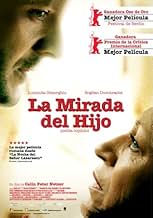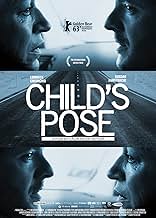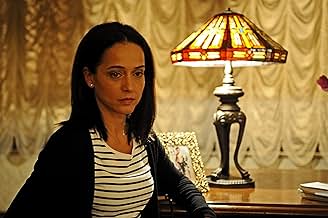Dopo la terribile notizia di un fatale incidente d'auto che ha coinvolto suo figlio, una madre disperata farà di tutto per liberare suo figlio.Dopo la terribile notizia di un fatale incidente d'auto che ha coinvolto suo figlio, una madre disperata farà di tutto per liberare suo figlio.Dopo la terribile notizia di un fatale incidente d'auto che ha coinvolto suo figlio, una madre disperata farà di tutto per liberare suo figlio.
- Regia
- Sceneggiatura
- Star
- Premi
- 13 vittorie e 8 candidature totali
- Leontina Vaduva, the Soprano
- (as Leontina Väduva)
Recensioni in evidenza
Reading bad reviews upfront, was afraid about getting bored from being too long, or dizzy from excessive use of hand held camera. Happy to report none of them apply. Instead, last frame was finding me quite surprised about how fast it was finished.
This film reminds me very much of "A separation" of Farhadi. They touched me in the same way, although the stories were different. That is because both stories are just recipients for emotions.
And in the end, this movie is full of emotions, human, universal, atemporal emotions. And that is what makes this film great.
"Child's Pose" isn't anywhere nearly as depressing as other Romanian films I've seen ("The Death of Mr. Lazarescu" comes to mind), but it's still a very mournful and sad story about a spoiled brat rich "kid" (his age is never stated that I remember, but he's easily in his late 20s at least) who kills a child in an auto accident and then sits back while his overbearing mother tries to use his family's affluence to buy their way out of the consequences. The dynamic between the mother and son is fascinating, and Luminita Gheorghu as the mother gives one of the best female performances of the past year. She creates a wholly believable character that feels like the kind of person you might actually come across in actuality; she's not exactly a bad person, but at the same time she's a bit of a monster in her single-minded determination to make her and her family's lives as easy as possible without being able to maintain any perspective on what the world is like for others who are not as fortunate.
The climactic scene in which she visits the parents of the dead child and then prattles on about herself and her own son, hijacking the parents' grief for her own and making the situation all about her, is a quietly masterful feat of acting and writing. It felt SO authentic and so like people and situations I've dealt with directly myself. I wish the film had ended with that instead of giving us a forced redemptive ending that felt a tad false, but it packs a wallop nonetheless.
Grade: A
The story: Cornelia, a middle-aged high society architect, is informed by her sister-in-law that her son Barbu has killed a child in a traffic accident, and both immediately proceed to the police station where he is being held for questioning. They barge into the interrogation, all the while phoning useful contacts, and manage to change Barbu's statement, after which they take him back to his parent's house. In the following days, Cornelia develops various schemes to get Barbu off the hook of a trial, receiving unexpected support from Barbu's wife (or girl-friend) Carmen, even though they thoroughly hate each other.
The accident itself is not the main story. It serves as a backdrop for highlighting the blatant disregard of the rich for the poor, the pervasiveness of corruption in Romanian society, and to illustrate how possessive and self-serving Cornelia is. Most screen time is devoted to Barbu's 'cutting of the post-natal umbilical cord', his sometimes desperate, mostly half-hearted attempts to gain independence from his overprotective mother.
The strength of the film lies in the ambiguity of its characters, foremost Luminiţa Gheorghiu's Cornelia, which she brilliantly portrays as a vicious self-obsessed diva totally immune to the plight of others, and who is still thoroughly devoted to her son. The viewer is torn between disgust and pity for her, for instance, when stopping in front of the killed child's parents, she exclaims 'Damn, it's one of the better houses', indicating that her only interest is to buy the parents' consent to revoke their claim against Barbu. Yet when sitting with them at a table, she so tearfully describes her plight that one cannot help but feel moved. Barbu, on the other hand, is a hypochondriac and coward, who for most of the time cannot admit to what he has done, but when he argues with Cornelia to back off, one cannot help but wonder how he could have turned out any other way, given the obsessive nature of his mother.
The real icing on the cake, however, is a brief scene between Cornelia and the principal witness to the accident, whom she hopes to bribe. Vlad Ivanov (of 'Doctor Bebe' fame in '4 months 3 weeks 2 days') once again plays a cynical ruthless character who confronts the female protagonist with the fact that the situation forces her to do precisely what he wants - well, maybe not quite. This scene is the best of any Romanian film I have seen in the past five years and merits the price of the ticket alone.
What may elude a non-Romanian viewer of this film is that the title itself is also ambiguous, 'poziţia copilului' being a wordplay with 'poziţia corpului', which means 'position of the body', a term used in police reports to describe the location of an accident victim when found. This recalls 'poliţist, adjectiv' by Corneliu Porumboiu, which in 2009 won the Un Certain Regard Jury Prize in Cannes. That title is also a wordplay, and Netzer shares many stylistic resemblances with Porumboiu.
If the film isn't perfect, then because of Netzer's tendency for emotional overkill; he rides his protagonist's credibility a little too hard sometimes, as in his debut feature 'Maria' (2003). However, that film is still alive in my memory precisely because the misery of the main character was so all-encompassing, so he may be using exaggeration as an artistic tool. 'Child's Pose' is a little too obviously geared towards festival expectations rather than domestic audiences - Romanians tend to prefer their social criticism with a large dosage of humor, as in all-time favorite 'Filantropica' (2002) by Nae Caranfil. But since the acting is mostly nothing short of brilliant, these calculations do not harm the film's artistic value and social message.
Cornelia Keneres, portrayed with masterful understatement and restraint by Luminita Gheorghiu, is a haughty, emotionally aloof woman who, nevertheless, just can't seem to cut the cords that bind her to her only child, Barbu (Bogdan Dumitrache). Barbu, of course, resents his mother's endless interference in his life, an interference that is only intensified when he tragically runs over and kills a 14-year-old boy who's crossing a freeway on which Barbu is driving recklessly. Because Barbu seems devoid of initiative in trying to make things right with both the legal system and the family of the victim, Cornelia launches into full Mama Bear mode, lavishing large sums of money in her wake as she attempts to clean up the life-shattering mess her son has made for himself and others. Is Cornelia now paying the consequences for treating her son as a child for so long? Is that why he now finds himself unable to step up to the plate and accept responsibility for his actions as a mature adult should?
Filmed in a wholly realistic and naturalistic style, "Child's Pose" is about as far from melodrama as a movie about life-and-death issues could possibly be. There are no grand speeches, no emotional outbursts springing from the tragic events of the story. The movie makes us feel as if we are eavesdropping on these people as they go about the business of trying to make sense of an entirely senseless situation. As such, we get to witness first-hand the agony and grief, the bitterness and guilt, and the thirst for redemption that the various characters are going through.
As embodied by the extraordinary Gheorghiu, Cornelia becomes a fascinatingly complex character made up of any number of inconsistencies and contradictions. For instance, she's constantly deriding Barbu for not being a man, for making a mess of his life and not fulfilling the hopes she and his father had for him when he was younger. Yet, it is her very insistence on meddling, mothering him and stepping in to solve all his problems that is the key factor in making him this way. And is she truly moved by the concerns of the grieving parties or is she motivated more by the fate of her own son and the guilt she might be feeling for the way she raised him?
Flawlessly written and directed by Cailin Peter Netzer (with Razvan Radulescu as co-writer), the movie ends on a powerful note, one that hints at the barest possibility for reconciliation and redemption for the individuals involved. It's a largely wordless moment, heartbreakingly silent and obliquely shot, and it is a moment that will linger long in the memory of anyone who sees it.
Lo sapevi?
- QuizOfficial submission of Romania for the 'Best Foreign Language Film' category of the 86th Academy Awards in 2014.
- Citazioni
Cornelia Keneres: What did I do wrong?
Barbu: Never mind now. I'm putting this on the table. You can say yes or no. You either let me call you when I feel like it, or it's nothing. And a suggestion. If it's hard, find a substitute. A dog, a lover, a hobby. People your age visit the Pyramids.
Cornelia Keneres: Other people my age have a normal relationship with their child. Parents find their fulfillment in their children. Everything they failed to accomplish, they achieve through their children.
Barbu: So we're agreed.
I più visti
- How long is Child's Pose?Powered by Alexa
Dettagli
- Data di uscita
- Paese di origine
- Siti ufficiali
- Lingue
- Celebre anche come
- La postura del hijo
- Luoghi delle riprese
- Aziende produttrici
- Vedi altri crediti dell’azienda su IMDbPro
Botteghino
- Budget
- 850.000 € (previsto)
- Lordo Stati Uniti e Canada
- 97.170 USD
- Fine settimana di apertura Stati Uniti e Canada
- 12.955 USD
- 23 feb 2014
- Lordo in tutto il mondo
- 994.126 USD
- Tempo di esecuzione1 ora 52 minuti
- Colore
- Mix di suoni
- Proporzioni
- 2.35 : 1
Contribuisci a questa pagina





























